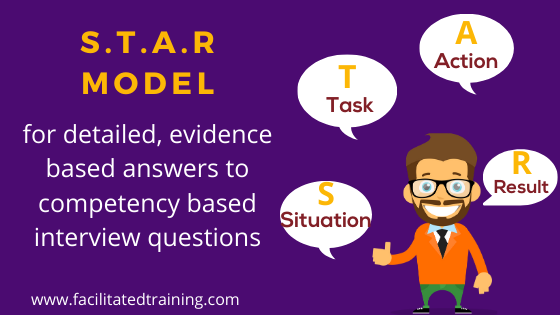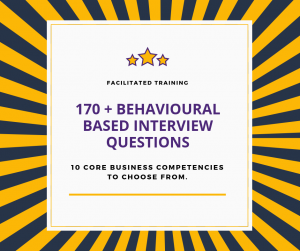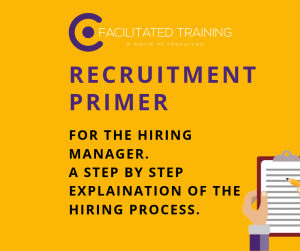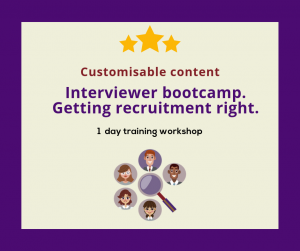What is a behavioural based interview?
According to Balanced Careers, Behavioural based interviewing is interviewing based on discovering how the interviewee acted in specific employment-related situations. The logic is that how you behaved in the past will predict how you will behave in the future, i.e., past performance indicates future performance.
Why are behavioural interviews effective?
Behavioural interviewing is not only beneficial for the company recruiting, but also for the candidate, it reveals personal strengths and weaknesses so that future assignments can be tailored for the best professional fit.
Behavioural interview also reduced a ‘canned response’ that the candidate shares based on what the interviewer or company theoretically wants to hear.
Behavioural interview questions are opened questions, eliciting a deeper answer than a closed question, such as “are you a good leader?” which will result in a short, yes or no answer.
Providing Real Life Examples
This is about being able to “walk the talk”. Anybody can say on their resume that they have superior leadership skills or that they are seasoned problem solvers.
In fact, according to a 2017 employment screening benchmark report, 85 percent of employers caught applicants falsely altering their resumes or applications. Behavioural questions help to partly circumvent this issue by pushing job candidates to go beyond their resume. A behavioural interview requires the candidate to provide solid, concrete examples of past experiences. More than a bullet point on their resume. For example, when interviewing candidates for a receptionist role, asking a situational question about their experience with simultaneously juggling multiple tasks allows the interviewer to see exactly what that candidate has accomplished in his or her previous roles.
Benefits of behavioural interviewing
Behavioural interview questions can make candidates less nervous by making the flow of conversation more natural. Since the focus of these sorts of questions is akin to telling a story in a normal conversation, candidates will feel more comfortable, allowing them to rid their feelings of anxiety or nervousness.
How to tell when you are being asked a behavioural interview question.
When you hear the words: “Tell me about a time when…” it’s highly likely that the hiring manager is asking you a behavioural interview question. Other variations include:
“Describe a time when…”
“Give me an example of…”
“Have you ever…?”
What is the best way to answer behavioural interview questions?
Frequently, the STAR approach is used.
The STAR method is a procedure taught to help people provide thoughtful answers that contain fully-formed beginnings, middles, and ends. STAR stands for Situation, Task at hand, Action you took, and Result. This method allows you to tell a fluid story starting with the situation, moving to the task you were assigned, going onto the action you took, and finishing up with the result of what happened in this particular instance- so hopefully it was a good one.
We use this method so that we know that we’re going through and telling a story that has a beginning, a middle, and an end.
Situation: Describe the situation that you were in or the task that you needed to accomplish. You must describe a specific event or situation, not a generalized description of what you have done in the past.
Be sure to give enough detail for the interviewer to understand. This situation can be from a previous job, from a volunteer experience, or any relevant event.
Task: What goal were you working toward?
Action: Describe the actions you took to address the situation with an appropriate amount of detail and keep the focus on YOU. What specific steps did you take and what was your contribution? Be careful that you don’t describe what the team or group did when talking about a project, but what you actually did. Use the word “I,” not “we” when describing actions.
Result: Describe the outcome of your actions and don’t be shy about taking credit for your behaviour. What happened? How did the event end? What did you accomplish? What did you learn?
Make sure your answer contains multiple positive results. Make sure that you follow all parts of the STAR method.
Be as specific as possible at all times, without rambling or including too much information. Oftentimes students have to be prompted to include their results, so try to include that without being asked.
Be mindful that you will also need an example where an outcome wasn’t successful, where you can demonstrate reflection and what you would do differently, in a similar situation in the future.
The STAR method helps you create an easy-to-follow story with a clear conflict and resolution. Let’s see how this works in practice.
Question: Tell me about a time where you were required to meet a deadline in a challenging environment. What steps did you take and what was the outcome?
Situation
“In my last role as lead designer, my team was short-staffed and facing a significant backlog of work. The account managers were setting unrealistic deadlines, which was causing stress for my team and affecting morale.”
Task
“As a team leader, it was my role to not only ensure my team met our deadlines, but also to communicate bandwidth to other departments and keep my team motivated.”
Action
“I set up a formal creative request process including project timeline estimates to set better expectations. I scheduled weekly meetings with account managers to discuss my team’s bandwidth and share progress updates.”
Result
“By providing more transparency into my team’s processes and setting better expectations with the account managers, we were able to re-prioritise the design team’s to-do list and complete everything in our backlog. The following quarter, we shortened our average project timeline by two days.”
How to prepare for a behavoural interview.
- Do your research. Find out what skills and behaviours the employer is looking for, and mine your own CV to find examples that you think will demonstrate a good match for the role.
- Where possible utilise the job add and or job description to determine key areas that the interviewer will focus on.
- Recall recent situations that show favourable behaviours or actions, especially involving course work, work experience, leadership, teamwork, initiative, planning, and customer service.
- Prepare short descriptions of each situation; be ready to give details if asked.
- Use the STAR model to build your examples.
- Be sure example demonstrates a beginning, middle, and an end, i.e., be ready to describe the situation, including the task at hand, your action, and the outcome or result.
- Be specific. Don’t generalize about several events; give a detailed accounting of one event.
- Practice the STAR method out loud in advance. If you remind yourself of the acronym while telling your story, you’ll stay on point.
- Don’t keep referring to the same experience. Arrive at an interview armed with a few different examples that you can adapt according to the different questions asked.
- More sample behavioural interview questions
Want some more practice? Here is a list of commonly asked behavioural interview questions:
Communication
- Have you ever had to get buy-in from a resistant audience to a project or idea? Tell me how you approached it.
Achievements
- Tell me about your greatest career achievement to date. Can you describe what steps led to the outcome?
Leadership
- Tell me about a time when you had to lead a project and your other team members weren’t contributing as you had envisaged. How did you tackle the situation?
Attention to detail/organizational ability
- Tell me about a time where you discovered an error, made by either yourself or a colleague. What did you do? How did you approach the situation?
Teamwork
- Describe a situation where you had to make an unpopular decision. How did you go about communicating it to your team?
Have you ever wondered what behavioural interview questions (BIQs) are – and how to answer them? We’ve compiled the ultimate guide to help you respond to BIQs with ease in your next interview.
170+ behavioural interview questions
Need assistance to manage the recruitment process? Check out this resource:
Recruitment Primer
Do you need to upskill your managers and recruitment team to recruit more effectively? Facilitated Training has you covered.
Targeted, professional development courses enable you to deliver effective training sessions that get the key message across and retain participant involvement.
Save hours of research and development time. We have done all the hard work so you can focus on the training delivery
Own complete rights to edit, copy, and reuse the training materials. You can even brand it with your business logo and name.
Download all training courses and courseware packages immediately in their source files.
Facilitated Training has the solution that you need. Editable training materials that can be used again and again. Insert your company logo, add in case studies or examples from your workplace, or train using the quality training materials, as is.
Facilitated Training is your one-stop-shop for world-class, customisable training and professional development resources.
Facilitated Training offers training and organisational development resources to facilitators, trainers, coaches, HR managers and individuals.
Specialising in customisable leadership and management skills, Facilitated Training features a wide variety of products, including Training resources, Professional development courses, assessments, ebooks, videos and more.
Click here for customisable training materials that will assist your workplace in managing resources and output.
About the author: Colleen Condon
Colleen likes to keep things creative in all that she does, often using marshmallows as a source of inspiration.
Everyone knows that ongoing learning is essential for both personal and professional success and yet, for many, this means hours of attending dead boring training or completing’ losing the will to live’ eLearning modules. Colleen’s mission is to end tedious professional development while ensuring targeted outcomes for learners and businesses.
Colleen has honed her skills over the last 20 years across multiple industries and locations. Her previous role saw her overseeing the training and development needs of over 60, 000 employees across 13 countries in the APAC region. This enabled her to hone skills that celebrated diversity and understanding human commonality through learning, and that in the absence of a common language, flip charts and colored markers helped her to overcome most challenging situations.
In 2019, Colleen founded her own business, Facilitated Training, harnessing her global learning experiences and sharing them through ready to use learning resources, specialising in leadership, mentoring, guest speaking, creative problem solving, filling the gap of high quality, customisable training resources and tools.




